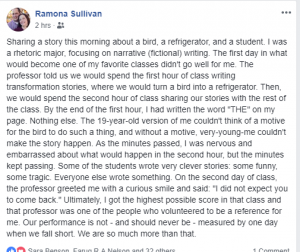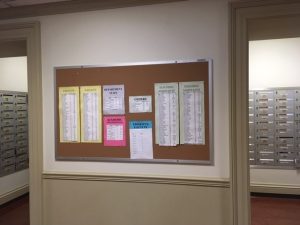 The holidays bring with them many opportunities to connect with loved ones. And chances are, those loved ones are going to ask you how college is going and what you’re going to do when you graduate.
The holidays bring with them many opportunities to connect with loved ones. And chances are, those loved ones are going to ask you how college is going and what you’re going to do when you graduate.
The flexibility and open-endedness that makes majoring in English or Creative Writing a joy can seem less so when you’re being quizzed by a family member who doesn’t quite see how that amazing class in critical theory or modernist literature or poetry writing is going to help you cope with life after graduation.
Some preparation can make those holiday conversations less daunting.
Here are some resources to help you talk to the people who love you about your prospects and plans.
“English/Creative writing majors don’t get jobs — maybe you should switch to something more practical.”
Just wrong. Wrong in general, but also specifically wrong for the University of Illinois. Read the data, know the numbers. Save the links on your phone to show the disbelieving. Need more talking points? Try this, this, this, or this.
“So you’re going to teach, right? Or maybe go into publishing? What else do people do with an English (or Creative Writing) degree?”
Some English or Creative Writing majors do go into teaching or publishing, Many do not. Every business, organization, industry needs people who can solve problems with words. You have choices to make about where to use your skills. Take some time to browse this very blog for additional information on jobs that English majors do. Some possibilities include human resources, advancement/nonprofit fundraising, communication, business consulting, science journalism, running small businesses, legal writing, project management, book publishing, video editing, science editing, project operations, PR and digital marketing, librarianship, B2B publishing, entrepreneurship, content creation, higher ed administration, manufacturing, events coordination, sales management, data research, management training, and real estate development.
“You’ll have to go to grad school to get a job, won’t you? What grad school are you thinking about?”
Well, no — you don’t need to go to law school or get a master’s degree to be employed — but you may want to get more education to achieve specific goals. “Grad school” doesn’t have to mean further education leading to a teaching or law career — recent alumni have chosen to get advanced degrees in bioinformatics, business, education administration, human resources, information/library science, medicine, nursing, social work.
“Hmph. Okay. But you’re graduating in____, right? So what’s your plan?”
There are many things you can do to reassure the people who care about you that you’re on your way to a stable, self-supporting adult life. Don’t have a specific career in mind yet? That’s okay — tell them about some concrete steps that you’re taking now that will help you get a job when you graduate.
- Find time to go to the LAS Life + Career Design Lab
- Sign up for a course that will give you some professional skills:
- Publishing and Editing (ENGL 199 – E, 1:00 – 1:50pm MWF, Prof. Hapke, CRN: 53975)
- Self-Publishing and Digital Branding (ENGL 380, 11am -11:50am MWF, Prof. Gallagher)
- Environmental Writing for Publication (ENGL 498, 12:30 – 1:50pm TR, Prof. Wood)
- apply for a spring or summer internship.
- find a part-time job that will help build your skills.
- create or update your resume
- sign up for alumni mentoring and start scheduling some informational interviews to help you build your network.
- get to know Handshake and start checking it regularly to learn more about the kinds of jobs you’d like to apply for. (Pro-tip: use the job function filter to explore the opportunities in different potential careers. “Writing/Editing” is an obvious one to try — but certainly not the only one available to you.)
- get involved in a campus publication
- register for a career preparation course:
- Career Fair Preparation (ENGL 199 – CIP, online, Prof. WIlcox, eight weeks, one credit, Jan 14 – Mar. 8)
- Career Planning for Humanities Majors — freshmen and sophomores (ENGL 199 – FS, 4:00 – 5:30pm M, Prof. Wilcox, eight weeks, one credit, Mar. 11 – May 1)
- Career Planning for Humanities Majors — juniors and seniors (ENGL 199 – JS, 4:00 – 5:30 Tm Prof. Wilcox, eight weeks, one credit, Mar. 11 – May 1)
- schedule an appointment to talk to Kirstin Wilcox, Director of Internships by calling 333-4346.
- find some upcoming Career Center events that will be helpful to you and put them on your calendar.
- follow up on contacts your family has suggested to you.
- practice your elevator pitch, get your professional attire, and research employers to get ready for the Gies Business Career Fair.
“<changes subject>”
Take some time to remind yourself why you got into this major in the first place. Spend time with a book you want to read and haven’t been assigned. Write a poem. Make a trip to the nearest independent or used bookstore. Storyboard your screenplay or graphic novel ideas. Geek out by surfing Open Culture, Paris Review, LA Review of Books. Watch a movie with some intellectual heft to it. Send an email to the teacher who first got you excited about words. Let yourself get lost in the sheer joy of language.




 The holidays bring with them many opportunities to connect with loved ones. And chances are, those loved ones are going to ask you how college is going and what you’re going to do when you graduate.
The holidays bring with them many opportunities to connect with loved ones. And chances are, those loved ones are going to ask you how college is going and what you’re going to do when you graduate.